
A local company that provides recycling bins and pickup service to homes for QR50 a month is broadening its reach in Qatar.
Global Metals LLC has been collecting, processing and recycling materials in the country since 2008.
After working with several private companies for years, it began offering home recycling services in 2014, but was met with very little success, its managers told Doha News.
Recycling is not a government requirement in Qatar, and there is a general lack of awareness and willingness to engage in the practice here, operations manager Andy Isip and marketing manager Shiela Licuanan said.
Where to start
Speaking to Doha News, Isip added that most people don’t know the benefits of recycling, or how to start.
“The first step to recycling is segregating and categorizing their waste. They need to make sure their waste doesn’t reach the landfills. As simple as that. But it can take a long time for people to do it on their own,” he said.
Two years ago, Global Metals experimented with offering free bins at compounds around Qatar, but found that residents were either throwing regular garbage in them, or not using the bins at all.
This is when they decided to implement a QR50 fee, Licuanan added.

Now, the company offers at-home recycling services for almost 200 homes in the country.
How it works
It operates on a single-stream recycling system, in which all plastics, metals and other containers go into the same collection truck.
“We let residents put the recyclables in one bin only and we take care of the sorting in our facility. We don’t give them separate bins because recycling comes with a cost, especially since we are a private company. We don’t want to burden our clients by paying more for the bins,” Licuanan said.
A truck comes by every two weeks to empty the bins, which also include a separate one for paper products. Global Metals said it usually ships paper items to China for recycling, and processes the rest locally.

At some compounds, residents have put in requests for larger bins, which cost QR75 for a container that’s about double the size of the original.
So far, the company operates in residential compounds. It tries to entice customers by approaching the compound’s management team with flyers and informing them about its services.
It’s then up to the compound managers to enlist Global Metals, or to ask residents if they’re interested in the idea.
“We are not allowed to personally go to people’s homes and talk to them because people really respect privacy here,” Licuanan told Doha News.
“We are only allowed to speak to management, and if they agree, they let us hand out the flyers outside people’s homes, the clubhouse and reception areas. If residents are interested, they call us.”
Recycling spirit
Global Metals does not offer recycling services to individual flats or villas yet.
This and other barriers has made it hard for some residents who actually want to recycle to do so.

For example, American expat Harvey Russell has been collecting soda cans every day for two years.
His current can collection surpasses 50 pounds (about 23kgs). He said for months, he’s been trying to contact recycling companies and newspapers to tell them about his collection.
But responders have either told them to drop off the bags himself or not replied at all.

“I don’t have transportation and there are too many bags for me to drop them off. It’s only reasonable for them as recycling companies to come pick it up themselves,” he told Doha News.
Growing up in the US, where recycling is required by law in most states, Russell said people simply need to be educated about its importance.
“I think it’s something that is really so easy to do but you ever so rarely see that bin that says ‘put your aluminum here, put your newspapers here, your plastic bottles here,’ ” he said.
“All it takes is educating the public and shaming them into walking an extra 10 feet to the bin. It’s not even the locals doing this. It’s us expats who are throwing things on the floor instead of where they belong.”
Russell will be leaving to the US for good next week, and his collection remains at his house for now.
What happens after pick-up
At first, Global Metals only recycled aluminum and metal. It eventually began processing plastics in 2010.
It is also the only company in Doha to partake in PET recycling, a category of recyclables that includes drinking bottles.

On average, the company receives 800 tons (nearly 800,000kg) of tin cans per month, all of which come from households via a supplier.
It also collects 300 tons (nearly 300,000kg) of plastic, and 180 tons (near 180,000kg) of aluminum.
The company has two recycling facilities, one in a 30,000sqm area in Umm Saeed, where plastic, aluminum and metal are recycled.
The other is in the Industrial area, where only ferrous materials are recycled in an area of 1,500sqm.
Failed attempts
Qatar has one of the world’s highest rates of waste production per capita, at around 1.6kg to 1.8kg each day.
This adds up to at least 7,000 tons of daily waste, with 30 percent (2,100 tons) generated by households.

The government has made several attempts to introduce wider recycling schemes, but all have seen limited success.
Earlier this year, a minister pledged to install more recycling bins around town.
There are several public recycling points through Doha – such as in Katara Cultural Village and outside some malls – and Ikea has a recycling drop-off station inside its store for plastics, paper, cardboard, light bulbs and batteries. Some housing compounds also run their own service.
But most of these rely on committed people driving some distance to dispose of their waste properly.
Thoughts?







